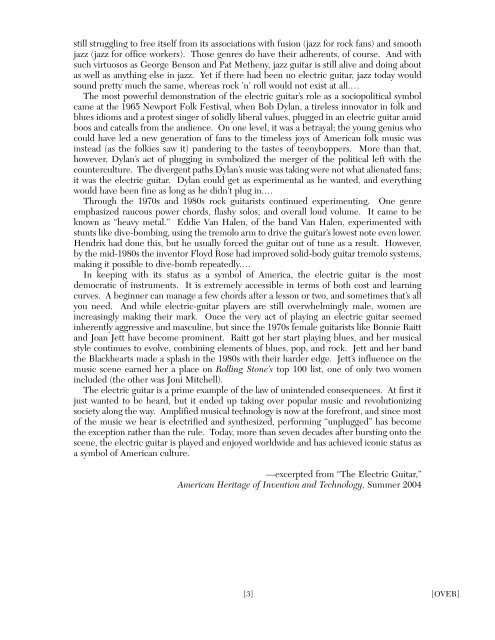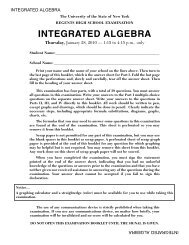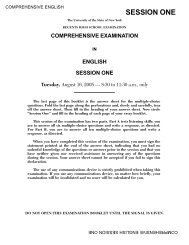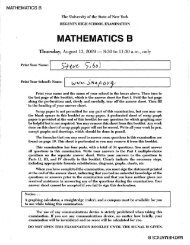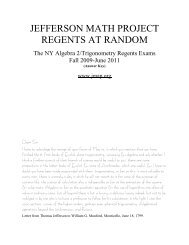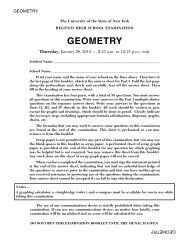SESSION ONE - JMap
SESSION ONE - JMap
SESSION ONE - JMap
You also want an ePaper? Increase the reach of your titles
YUMPU automatically turns print PDFs into web optimized ePapers that Google loves.
still struggling to free itself from its associations with fusion (jazz for rock fans) and smooth<br />
jazz (jazz for office workers). Those genres do have their adherents, of course. And with<br />
such virtuosos as George Benson and Pat Metheny, jazz guitar is still alive and doing about<br />
as well as anything else in jazz. Yet if there had been no electric guitar, jazz today would<br />
sound pretty much the same, whereas rock ’n’ roll would not exist at all.…<br />
The most powerful demonstration of the electric guitar’s role as a sociopolitical symbol<br />
came at the 1965 Newport Folk Festival, when Bob Dylan, a tireless innovator in folk and<br />
blues idioms and a protest singer of solidly liberal values, plugged in an electric guitar amid<br />
boos and catcalls from the audience. On one level, it was a betrayal; the young genius who<br />
could have led a new generation of fans to the timeless joys of American folk music was<br />
instead (as the folkies saw it) pandering to the tastes of teenyboppers. More than that,<br />
however, Dylan’s act of plugging in symbolized the merger of the political left with the<br />
counterculture. The divergent paths Dylan’s music was taking were not what alienated fans;<br />
it was the electric guitar. Dylan could get as experimental as he wanted, and everything<br />
would have been fine as long as he didn’t plug in.…<br />
Through the 1970s and 1980s rock guitarists continued experimenting. One genre<br />
emphasized raucous power chords, flashy solos, and overall loud volume. It came to be<br />
known as “heavy metal.” Eddie Van Halen, of the band Van Halen, experimented with<br />
stunts like dive-bombing, using the tremolo arm to drive the guitar’s lowest note even lower.<br />
Hendrix had done this, but he usually forced the guitar out of tune as a result. However,<br />
by the mid-1980s the inventor Floyd Rose had improved solid-body guitar tremolo systems,<br />
making it possible to dive-bomb repeatedly.…<br />
In keeping with its status as a symbol of America, the electric guitar is the most<br />
democratic of instruments. It is extremely accessible in terms of both cost and learning<br />
curves. A beginner can manage a few chords after a lesson or two, and sometimes that’s all<br />
you need. And while electric-guitar players are still overwhelmingly male, women are<br />
increasingly making their mark. Once the very act of playing an electric guitar seemed<br />
inherently aggressive and masculine, but since the 1970s female guitarists like Bonnie Raitt<br />
and Joan Jett have become prominent. Raitt got her start playing blues, and her musical<br />
style continues to evolve, combining elements of blues, pop, and rock. Jett and her band<br />
the Blackhearts made a splash in the 1980s with their harder edge. Jett’s influence on the<br />
music scene earned her a place on Rolling Stone’s top 100 list, one of only two women<br />
included (the other was Joni Mitchell).<br />
The electric guitar is a prime example of the law of unintended consequences. At first it<br />
just wanted to be heard, but it ended up taking over popular music and revolutionizing<br />
society along the way. Amplified musical technology is now at the forefront, and since most<br />
of the music we hear is electrified and synthesized, performing “unplugged” has become<br />
the exception rather than the rule. Today, more than seven decades after bursting onto the<br />
scene, the electric guitar is played and enjoyed worldwide and has achieved iconic status as<br />
a symbol of American culture.<br />
—excerpted from “The Electric Guitar,”<br />
American Heritage of Invention and Technology, Summer 2004<br />
[3] [OVER]


